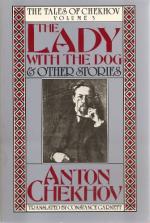|
This section contains 1,449 words (approx. 5 pages at 300 words per page) |

|
SOURCE: "Chekhov's Plays," in Saturday Review, Vol. L, No. 27, 8 July 1967, p. 18.
In this essay, Rexroth comments on the profound change in the nature of drama brought about by Chekhov.
It comes as a bit of a shock to sit yourself down and deliberately think, "In the first half of the twentieth century, the position once occupied in ancient Greece by Aeschylus, Sophocles, and Euripides was held, in the estimation of those who sought serious satisfaction in the modern theater, by Ibsen, Strindberg, and Chekhov." What had happened in two thousand years? Had it happened to the audiences, or to the playwrights, or to the self-evolving art of drama? Or was the change more profound than this, more profound even than a change in the meaning of civilization—was it a change in the very nature of man? We still say we enjoy Antigone; but if we go directly...
|
This section contains 1,449 words (approx. 5 pages at 300 words per page) |

|


